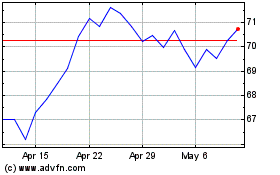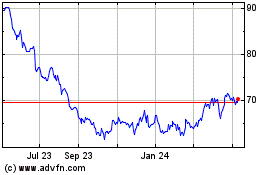General Mills Recalls Some 'Gluten-Free' Cheerios -- Update
October 05 2015 - 7:34PM
Dow Jones News
By Tess Stynes
General Mills Inc. is recalling 1.8 million boxes of Cheerios
because wheat flour was inadvertently added to cereal labeled
gluten-free, a gaffe that illustrates the challenges for big
companies adjusting to new consumer demands.
The recall, which represents less than 1% of annual sales volume
for Cheerios, comes after General Mills trumpeted in February that
it would start making five varieties of the storied brand,
including the original flavor and its better-selling Honey Nut
Cheerios, without gluten. The Minneapolis food maker said the new
boxes began appearing on shelves in late July.
In recent years, U.S. consumers have started to shun gluten,
which is found in wheat and other widely used grains. Some 20
million Americans have either a sensitivity to gluten or a
hereditary condition called celiac disease in which ingesting
gluten damages the small intestine. But others have turned to a
gluten-free diet in hopes of losing weight or gaining other health
benefits.
Food companies have looked for ways to cater to this growing
trend. Cheerios were a relatively easy target for General Mills
because oats, the main ingredient, don't contain gluten. But it
took General Mills years to make the brand gluten-free because it
was difficult to ensure its supply of oats weren't mixed with other
grains containing the allergen.
The company said it developed a way to sort out the small amount
of wheat, rye and barley that is unintentionally mixed in with
General Mills' supply of whole oats at the farms or during
transportation to its mill.
General Mills said in an email that it had tested the oat supply
and then the oat flour sent to the factory that made the recalled
Cheerios, and both met regulators' standard to be free of gluten.
However, General Mills lost rail service at the factory, so it had
to transfer the oat flour from railcars to trucks. The company said
that is when wheat flour was inadvertently mixed into the
gluten-free oat flour.
That caused General Mills to recall four days of production of
original Cheerios, with "better if used by" dates between July 14,
2016, and July 17, 2016, and 13 days production of Honey Nut
Cheerios, with "better if used by" dates between July 12, 2016, and
July 25, 2016.
The company said this was "an isolated incident," and that no
other cereals were affected.
The Cheerios were made in General Mills' Lodi, Calif., plant. In
September 2014, General Mills announced it would close that
factory, which employed about 430 workers, by the end of 2015.
General Mills has said it invested heavily in the construction
of a facility to separate oats and had to make changes to its
cereal plants, adding walls and cleaning procedures, to meet
federal regulators' standards for foods labeled gluten-free. The
Food and Drug Administration requires foods labeled gluten-free to
have less than 0.002%, or 20 parts per million, of gluten.
"It's the culmination of several years of hard work by hundreds
of General Mills employees who dedicated thousands of hours to
making it happen," General Mills said on its blog in July.
Gluten-free isn't the only food trend General Mills is trying to
tackle with Cheerios.
It also converted its Cheerios recipe to make its original
variety without genetically modified organisms, or GMOs, last year.
Even though it required switching out only a small amount of
ingredients, the company said that process also took years to
ensure the ingredients weren't contaminated.
Tess Stynes contributed to this article.
Write to Annie Gasparro at annie.gasparro@wsj.com
Subscribe to WSJ: http://online.wsj.com?mod=djnwires
(END) Dow Jones Newswires
October 05, 2015 19:19 ET (23:19 GMT)
Copyright (c) 2015 Dow Jones & Company, Inc.
General Mills (NYSE:GIS)
Historical Stock Chart
From Mar 2024 to Apr 2024

General Mills (NYSE:GIS)
Historical Stock Chart
From Apr 2023 to Apr 2024
